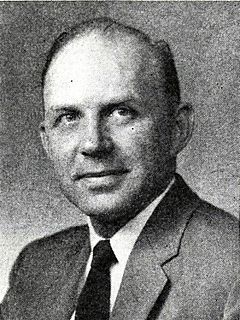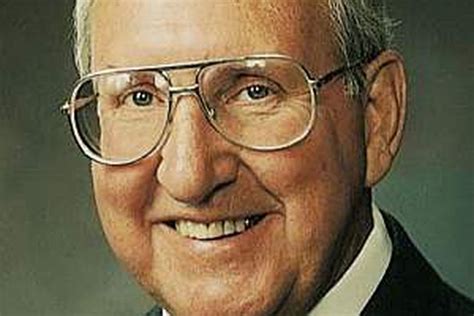A Quote by Saint Augustine
Trials and tribulations offer us a chance to make reparation for our past faults and sins. On such occasions the Lord comes to us like a physician to heal the wounds left by our sins. Tribulation is the divine medicine.
Related Quotes
Baptism by immersion for the remission of sins is an essential covenant to make with the Lord. Faith and repentance precede this ordinance. Confirmation and the gift of the Holy Ghost follow baptism. Acceptance of these first principles and ordinances may obtain for us a remission of our sins and assure our salvation. In the ordinance of the sacrament, we regularly renew this and other covenants, and by complying with our part of the covenant, we receive the Spirit of the Lord to be with us.
Governments can err, Presidents do make mistakes, but the immortal Dante tells us that divine justice weighs the sins of the cold-blooded and the sins of the warm-hearted in different scales. Better the occasional faults of a Government that lives in a spirit of charity than the constant omission of a Government frozen in the ice of its own indifference.
Our Heavenly Father knows us and our circumstances and even what faces us in the future. His Beloved Son, Jesus Christ, our Savior, has suffered and paid for our sins and those of all the people we will ever meet. He has perfect understanding of the feelings, the suffering, the trials, and the needs of every individual.
This is our punishment, our Tribulation. God has abandoned this world. The faithful have already gone on to their reward, and he has left the rest of us here, at the mercy of the demons and the devils. The sins of our fathers have passed to their children, and their children's children, and it will continue to be so until this world is completely destroyed. So it doesn't matter if you believe in God or not, because He is not here.
Nothing can tend so much to humble us before the mercy and justice of God as the consideration of His benefits and our own sins. Let us, then, consider what He has done for us, and what we have done against Him; let us call to mind our sins in detail, and His gracious benefits in like manner, remembering that whatever there is of good in us is not ours, but His, and then we need not be afraid of vainglory or of taking complacency in ourselves.
Now, justification in this life is given to us according to these three things: first by the laver of regeneration by which all sins are forgiven; then, by a struggle with the faults from whose guilt we have been absolved; the third, when our prayer is heard, in which we say: 'Forgive us our debts,' because however bravely we fight against our faults, we are men; but the grace of God so aids as we fight in this corruptible body that there is reason for His hearing us as we ask forgiveness.
It is essential that we renew our covenants by partaking of the sacrament. When we do this with a sincere heart, with real intent, forsaking our sins, and renewing our commitment to God, the Lord provides a way whereby sins can be forgiven from week to week. Simply eating the bread and drinking the water will not bring that forgiveness. We must prepare and then partake with a broken heart and contrite spirit. The spiritual preparation we make to partake of the sacrament is essential to receiving a remission of our sins.
Apologizing for our past sins may reveal character and for a time lessen anti-Americanism abroad, but if it is done without acknowledging that the sins of America are the sins of mankind, and that our remedies are so often exceptional, then it only earns transitory applause—and a more lasting contempt that we ourselves do not believe in the values we profess.
There is no enemy can hurt us but by our own hands. Satan could not hurt us, if our own corruption betrayed us not. Afflictions cannot hurt us without our own impatience. Temptations cannot hurt us, without our own yieldance. Death could not hurt us, without the sting of our own sins. Sins could not hurt us, without our own impenitence.








































